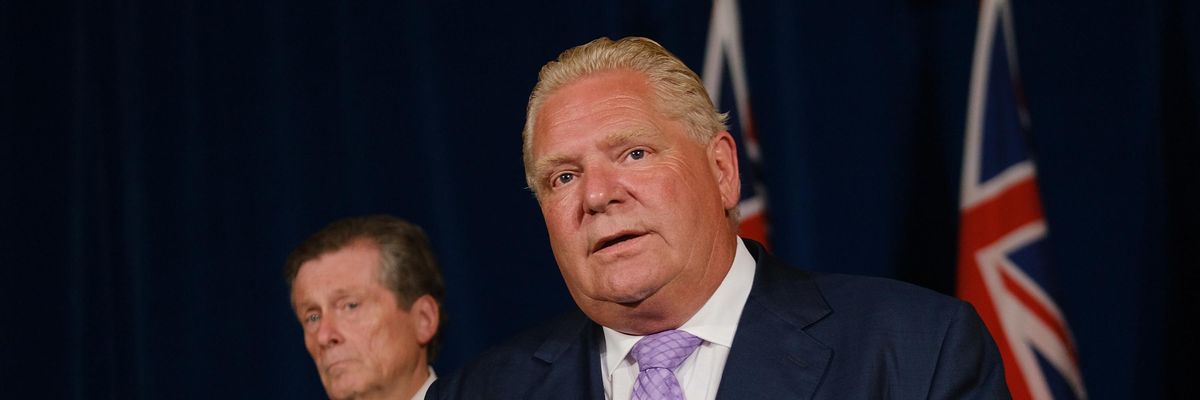Now that it's clear Premier Doug Ford will rule over Ontario for another four years, we can begin to survey the damage he's likely to do in some key areas--like health care.
It takes decades of careful planning and wilful treachery to devise a health-care system as wretched as the American one.
Somehow, Ford managed to get through the recent provincial election campaign with almost no scrutiny of his health-care plans.
The media is largely to blame. Media outlets mostly ignored the most significant thing Ford's Progressive Conservatives revealed during the campaign about their health-care plans: that they intend to expand private health care as a way to deal with the huge medical backlog created by the pandemic.
In other words, COVID will be the cover for doing what they want to do anyway.
Now, this doesn't mean we'll end up with a disastrous health-care system like the largely private one south of the border. It takes decades of careful planning and wilful treachery to devise a health-care system as wretched as the American one.
Instead, we'll maintain our basic public system, but more medical entrepreneurs will be allowed to operate private clinics, often as part of corporate chains. One thing is clear: these private operators will make a good profit for themselves, so that a growing portion of our public health-care dollars will go to enriching them.
In many cases, the private operators will offer faster access to medical services for their paying clients, rather than determining access to medical care based on who is sickest, as the public system requires.
It's easy to sympathize with private clients wanting to get treated as fast as possible. But faster service for them means slower access--or no access at all--for others.
That's because there are a limited number of medical professionals, and they all work within the same broad, publicly subsidized system.
The public system pays for the education of doctors and nurses employed by the private clinics, and it provides the high-level medical infrastructure of publicly funded hospitals, which are essential in case things go wrong at the clinics.
If the private operators were obliged to cover the full costs of providing their services--paying to educate their medical professionals and providing the sophisticated health-care infrastructure needed as backup--their costs would be astronomical and their business model wouldn't be viable.
Instead, private operators take full advantage of the public system, and then use their power within it to move their clients to the front of the line, ahead of sicker people who haven't paid them a fee.
In effect, the private clinics are, leeching off the public system. They couldn't exist without it. But even as they rely on the public system to function, they subvert its key goal of prioritizing patients by sickness.
In the process, the sickest patients are kicked to the curb.
If we reject this corporate freeloading, it doesn't mean we have to accept overrun emergency departments or endless waits for medical treatment.
Much of what ails our system can be fixed--not through the self-serving private solutions always being peddled, but by adequately funding our public system.
Ottawa definitely needs to increase its health-care funding. But so does Ontario--a rich province but a cheapskate when it comes to health care.
Ontario actually spends less per person on health care than any other province, according to Ontario's Financial Accountability Office, the province's independent financial watchdog.
It's this underfunding that creates a demand for private health care.
Consider this: if Ontario just spent as much as the average of the other provinces--which isn't setting the bar unduly high--it would mean an extra $7.6 billion a year for health care, notes Ricardo Tranjan, a political economist at the Canadian Centre for Policy Alternatives.
Imagine what could be done with that money! With even a small portion of it--$2 billion--Ontario could hire an additional 24,000 registered nurses.
I'd wager that an extra 24,000 registered nurses would do more to reinvigorate our overwhelmed emergency rooms than an influx of medical entrepreneurs, driven by a desire to redirect a big chunk of our public health dollars to themselves.

